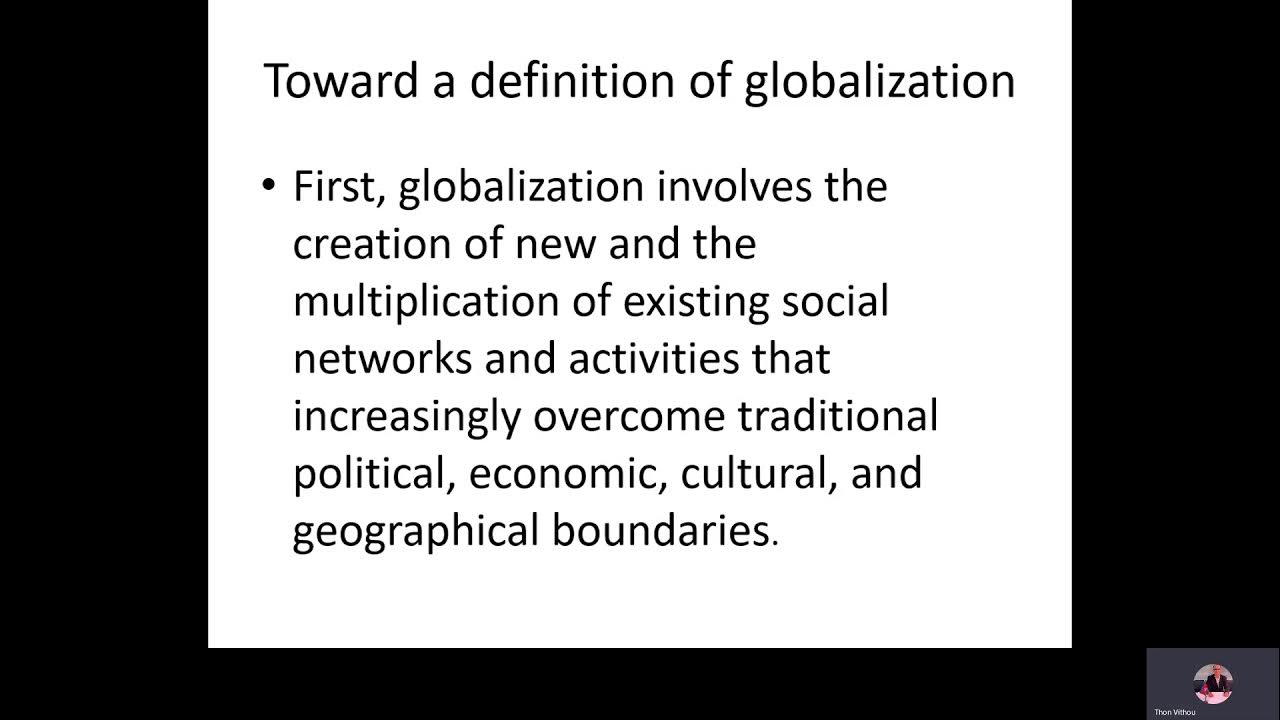Globalization in Five Minutes: The Future - Manfred B. Steger
Summary
TLDRManfred Steger discusses the future of globalization, presenting two opposing views. The first, 'deglobalization,' suggests a retreat to nationalism due to events like the financial crisis, Brexit, and COVID-19, leading to reduced global connectivity. The second, 're-globalization,' anticipates a rebound post-pandemic, emphasizing digital globalization with increased data flows and connectivity. The video leaves the outcome to the viewer's judgment, sparking thought on the direction of global integration.
Takeaways
- 🌐 Globalization refers to the increasing interconnectedness and mobility of people, things, institutions, and data.
- 📉 There is a debate on the future of globalization, with two main perspectives: deglobalization and re-globalization.
- 🔄 Deglobalization suggests a retreat to nationalism and a reduction in global connectivity due to events like the financial crisis, Brexit, and the rise of nationalist leaders.
- 🌀 The COVID-19 pandemic has accelerated the trend towards deglobalization by reinforcing national boundaries and reducing travel and trade.
- 🔄 Re-globalization proponents argue that despite current stagnation, there will be a rebound in global connectivity, especially in the digital realm.
- 💡 The re-globalization camp emphasizes the growing importance of data flows and digital connectivity, which may surpass the impact of traditional trade.
- 🌟 The future of globalization could be characterized by a shift towards digital globalization, with data playing a more significant role in the global economy.
- 🏛️ The debate between deglobalization and re-globalization hinges on whether the world will revert to a more nationalistic stance or embrace digital connectivity.
- ⏳ The script suggests that the next decade will be crucial in determining the trajectory of globalization, with the potential for either a retreat or a digital leap forward.
- 🤔 The speaker leaves the decision to the audience, inviting them to consider the factors and decide which future of globalization they believe is more likely.
Q & A
What is the main topic discussed in Manfred Steger's talk?
-The main topic discussed is the future of globalization, focusing on whether we will see deglobalization or re-globalization.
What does Manfred Steger define as globalization?
-Globalization is defined as the growing connectivity, mobility, and imagination of people, things, institutions, and data.
What are the two schools of thought regarding the future of globalization mentioned in the script?
-The two schools of thought are 'deglobalization' and 're-globalization'.
What are the arguments for the deglobalization perspective?
-The deglobalization perspective argues that a triple whammy of a global financial crisis, the rise of nationalism, and the COVID-19 pandemic have weakened globalization, leading to a potential retreat into nation states.
What are some examples of nationalism mentioned in the script?
-Examples of nationalism mentioned include Brexit, the rise of Donald Trump, and the nationalist movements led by figures such as Viktor Orban in Hungary and Recep Erdogan in Turkey.
What does the deglobalization camp predict for the next decade?
-The deglobalization camp predicts less connectivity, mobility, and global imagination, with people retreating into their nation states and increased barriers to global interaction.
What is the re-globalization perspective's view on the future?
-The re-globalization perspective suggests that after the COVID-19 pandemic, there will be a rebound in global connectivity, especially in the areas of data flows and digital globalization.
How does the re-globalization camp differentiate itself from the deglobalization camp?
-The re-globalization camp believes in a shift towards more digital globalization, emphasizing the importance of data flows and information exchange over traditional forms of globalization like trade and physical movement.
What evidence does the script provide to support the re-globalization argument?
-The script points to the fact that data flows already contribute more to the world's gross national product than trade, indicating the growing importance of digital connectivity.
What is the conclusion of Manfred Steger's talk regarding the future of globalization?
-Manfred Steger leaves it to the audience to decide whether the future will be characterized by deglobalization or re-globalization, suggesting that the outcome is uncertain.
What does the term 'digital globalization' refer to in the context of the script?
-In the context of the script, 'digital globalization' refers to the increased importance of data flows, information, and digital connectivity in shaping global interactions, potentially surpassing traditional forms of globalization.
Outlines

This section is available to paid users only. Please upgrade to access this part.
Upgrade NowMindmap

This section is available to paid users only. Please upgrade to access this part.
Upgrade NowKeywords

This section is available to paid users only. Please upgrade to access this part.
Upgrade NowHighlights

This section is available to paid users only. Please upgrade to access this part.
Upgrade NowTranscripts

This section is available to paid users only. Please upgrade to access this part.
Upgrade NowBrowse More Related Video

Globalization in Five Minutes: The Current State - Manfred B. Steger

Globalization in Five Minutes: The Basics - Manfred B. Steger

Globalization | The Very Short Introductions Podcast | Episode 4

Globalization and Ideology in the Contemporary World: A Response to M. Steger

INTRODUCTION TO THE STUDY OF GLOBALIZATION by Manfred Steger | GROUP 1

IG CHAPTER ONE
5.0 / 5 (0 votes)